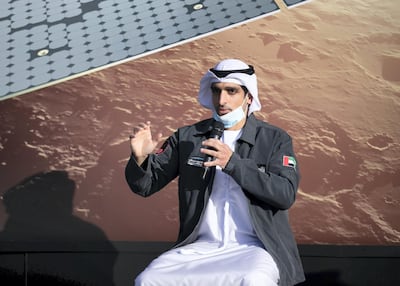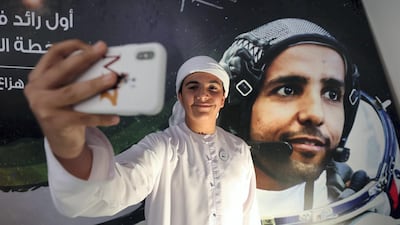The UAE’s mission to Mars will help the country find its “own version of Elon Musk and Bill Gates” even if the nation fails to reach Mars, a senior official has said.
Omran Sharaf, mission director, told The National that the goal of the Hope probe was to create a disruptive change in society that would inspire young people to pursue careers in Stem (science, technology, engineering and maths).
The spacecraft is less than a week away from attempting to enter the Martian orbit, a process that has only a 50 per cent success rate.
“There was a vision and goals we wanted to achieve – based on that the team designed a programme within this mission to create an impact,” Mr Sharaf said.
“The mission was launched in 2014 and, in that timeframe, you see the language of a whole generation and priorities change. Instead of pupils wanting to work in real estate or in finance sector, they talk about being entrepreneurs and innovators – being the future Elon Musk and Bill Gates of the UAE.”
Space is a relatively new sector in the UAE, but the country has already invested more than Dh22 billion in it.
Several key milestones have been achieved, including sending the first Emirati into space, building satellites in-house, launching the first Arab mission to Mars and now engineers are working on a lunar mission.
The nation’s space strategy has included collaborating with more experienced space agencies, like US’ Nasa, European Space Agency and Russia’s Roscosmos, to build on the UAE’s own capabilities.
For the Mars mission, for example, the Mohammed bin Rashid Space Centre worked with three American universities to help build the science instruments for the Hope probe.
To train its astronaut corps, Emirati astronauts are being sent to Nasa’s Johnson Space Centre for intensive training, which will help them qualify for Nasa-led missions in future.
However, to make the sector more sustainable, there has been a major push for space-focused subjects and degrees across UAE schools and universities.
Now, Mr Sharaf thinks other countries can use the UAE’s model as an example for building their own space sector.
“When we started, nobody was interested,” he said. “But, now, to see the way the Ministry of Education have change their curriculums and how schools and universities reacted, it’s amazing.
“I don't think any nation took a similar approach as the UAE when it comes to actually creating an impact and creating a disruptive change so fast.”
If the Hope probe manages to enter the Martian orbit, it will make the UAE the fifth nation worldwide to reach the Red Planet.
The data that will be retrieved from the mission will further boost Stem-related fields across the country, Mr Sharaf believes.
The spacecraft will attempt to enter orbit on February 9, at 7.42pm Gulf Standard Time.


















